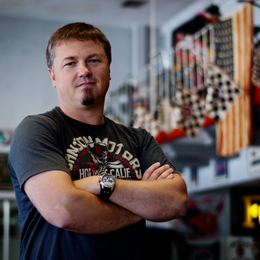
Even if you don’t know Edwin McCain by name, you know his songs—and certainly one song in particular: “I’ll Be,” which hit No. 74 on the Billboard Hot 100 in 1998. The song has become an enduring symbol of love and commitment, a justifiably popular favorite at weddings when it comes time for couples to share their first dance.
McCain comes to Ardmore Music Hall on January 8, for a show that will cover territory from his massive library of originals—he has produced 10 albums over the course of his 20-year career, as well as a recently released live album, “Live Versions”—plus a wide selection of covers. “The shows tend to be real conversational,” he says. “I enjoy making it funny and getting a sense of who they are, because each crowd is different.”
We caught up with McCain while he was doing “dad things” with his three kids—ages 8, 7 and 4—near his home in Greenville, S.C. He shared his thoughts on social media, artists who hate the songs that made them famous and why he considers himself the luckiest man alive.
Suburban Life: “I’ll Be” has been called the best wedding song ever written. Why do you think it struck such a chord and continues to do so?
Edwin McCain: For me it was a Hail Mary pass. When I wrote the song, there was a huge backlash toward Hootie & the Blowfish, and we had basically ridden into the record company on their coattails; there’s even a big misconception that I was in the band. We were terrified we were getting ready to get dropped from the label, because our first album sold a paltry 250,000 copies, and at the time that was terrible. Now if you sell 250,000 records, they hold a parade. The guy that signed me told me, “I’m keeping you, but you’ve got once more record, and you’d better come up with something great.” So I locked myself in my apartment in Atlanta and worked on [“I’ll Be”] and thought I had something. We got it on a couple stations in Mississippi, and then Time Warner turned on the big machine. I wish I could tell you anything about those 18 months, because it was a blur. The fact that it keeps on going amazes me; it gets 4,000 spins a week. I’m the luckiest person you know. We’re creeping up on 20 years, and every wedding season it gets a new life. I’m the guy who sings that song, where people say, “That dude who sings that song is playing at so-and-so.” So I’ve got 75 minutes to convince them of all this other music I have, so that hopefully by the time I get to “I’ll Be” they’ll have enjoyed the rest of it.
SL: You’ve been at it for almost 20 years. When you’re writing new music, what inspires you?
EM: When I was in my teens and 20s, I was writing about idealistic, global things, with the idea being that you could have some huge idea and make some giant impact and change the world with a song you wrote. I was thinking in terms of John Lennon and “Imagine.” I grew up listening to Earth, Wind & Fire, and their lyrics are incredibly peaceful and spiritual and impactful, so I gravitated toward to those. … I’m now in that weird, middle path of my life, where I still think “South Park” is funny but can’t hang out with 20-year-olds. I’m also laying down a foundation for my children, though sometimes I feel like a giant hypocrite, because there are things I think are funny that I don’t want them to see just yet. … It’s easier to write about the small moments [in life], because it takes away the potential to be really wrong. A perfect example is that I used to think there was no value to Twitter and Facebook or other kinds of social media, or rap music for that matter. I was thinking, What are these kids listening to? But those three things, which I almost completely discounted, have been incredible tools of social change. More and more I’m just standing around, knowing I have no idea and seeing what happens next.
SL: I’ve spoken with other artists who become known for a particular song. Some of them are appreciative, while others are resentful because they feel they’ve been typecast. Where do you stand?
EM: It’s mystifying, to be resentful of the greatest thing to ever happen to you. To be a musician and have a hit, it almost never happens. It’s like getting a winning lottery ticket and having it framed in your mansion and walking by it every day and saying, “Stupid lottery ticket.” You can’t get luckier than that. … I’m eternally grateful. I sit and wonder how lucky I could be.
SL: You use your time on tour pretty wisely. In the past, you trained for the New York Marathon, officiated weddings and who knows what else. What’s the most memorable?
EM: About three years ago I landed on an aircraft carrier off the coast of Korea. We flew in on the [USS] John C. Stennis and played for troops on the boat. We do military tours all over the world for the military and their families. I’ve even been to Patriot missile batteries outside of Bahrain. When we landed on the aircraft carrier, I was convinced it had gone wrong. It’s impressive that the planes hold it together upon landing because the G-forces are incredible. It was the craziest thing. It’s one of those lifetime moments. I’m a pilot, but being able to land on an aircraft carrier? I walked around with big stupid grin for a month.


